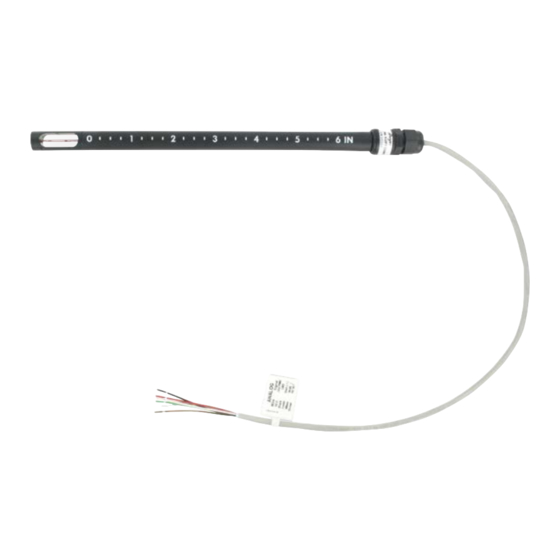Advertisement
Quick Links
Series AVPT Pencil Style Air Velocity Transmitter
Specifications - Installation and Operating Instructions
The Series AVPT Pencil Style Air Velocity Transmitter uses thermal anemometer
technology to provide high accuracy and stable air velocity measurements in imperial
and metric units. The Series AVPT can be configured with either a voltage output or
BACnet MS/TP communication to provide universal inputs to a variety of monitoring
equipment. Models are available with fixed cable lengths of 20 or 78 inches with flying
leads or a 5-pin M12 connector on a 24 inch cable. Probes are available in lengths
of 6 or 12 inches. A mounting flange included with the product provides the ability to
vary insertion depth.
Models are available in 3% or 5% accuracy to suit a variety of applications, while the
optional BACnet MS/TP communication protocol allows units to be daisy-chained to
provide access to all of the velocity and temperature measurements.
MODEL CHART
Example
AVPT -S 03 C1 A 06 127 -FC
Series
AVPT
Accuracy
S
H
Velocity
01
Range
02
03
04
05
10
15
20
Electrical
C1
Connection
C2
M1
Output Type
Probe Length
BACnet
Address
Options
DWYER INSTRUMENTS, INC.
P.O. BOX 373 • MICHIGAN CITY, INDIANA 46360, U.S.A.
AVPT-S03C1A06127-FC
Pencil style air velocity
transmitter
Standard ±5% of reading
+40 FPM
High accuracy ±3% of
reading +40 FPM
1000 FPM
2000 FPM
3000 FPM
4000 FPM
5 m/s
10 m/s
15 m/s
20 m/s
Cable whip 20˝ (0.5 m)
Cable whip 78˝ (2 m)
M12 24˝ (0.6 m)
A
Analog 0-5 V and 0-10 V
B
BACnet MS/TP
06
6˝
12
12˝
127
000-127 whole integer
with BACnet output
FC
Factory calibration
certificate
NIST
NIST traceable certificate
10 [254]
10 [254]
6˝ probe length
SPECIFICATIONS
Service: Clean air.
Ranges: 1000, 2000, 3000, or 4000 FPM (5, 10, 15, or 20 m/s); Model specific.
Accuracy: Standard: ±(5% reading +40 FPM); High accuracy: ±(3% reading +40
FPM); Model specific.
Power Requirements: 24 VAC/VDC ±20%.
Current Consumption: < 50 mA.
Outputs: Analog: 0-10 V (0-5 V configurable).
BACnet MS/TP: Selectable at time of order.
Supported Baud Rate: 9600, 19200, 38400, 57600, 76800, and 115200.
Voltage Output Load Resistance: 10k Ω minimum (10 V output with AC supply);
1k Ω minimum all other conditions.
Electrical Connection: Cable: Plenum rated cable with 22 AWG conductors.
5-Conductor Cable whip: 20˝ (0.5 m) or 78˝ (2 m).
5-pin M-12: 24˝ (0.6 m); model specific.
Response Time (90%): 4 s, typical.
Operational Temperature Limits: -4 to 140 °F (-20 to 60 °C).
Storage Temperature Limits: -40 to 140°F (-40 to 60°C).
Probe Length: 6˝ or 12˝; model specific.
Enclosure Rating: NEMA 3.
Mounting Orientation: Flow direction must be parallel to the sensor tip; See Instal-
lation section for details.
Weight: 1.4 oz (40 g); based on M12 connection with 12˝ probe length.
Agency Approvals: CE, RCM, BTL, UL plenum rated (UL tested).
INSTALLATION
Included Duct Mount Flange:
The transmitter should be mounted away from fans, corners, heating and cooling
coils, and other equipment that will affect the measurement of the air velocity. It is
recommended that the AVPT is mounted at least 10 duct diameters downstream of any
disturbances and 5 duct diameters upstream of any disturbances, if possible.
1. Mark and drill a 0.750-0.938˝ (20-24 mm) diameter hole into the duct.
2. Insert and center the duct mount flange in the previously drilled hole and mark
location of the three mounting screw holes.
3. Remove the mounting flange and drill or punch the mounting holes in the marked
locations.
4. Fasten the flange to the duct using three #8 x 1/2˝ pan head sheet metal screws.
Do not over tighten screws.
5. Insert the AVPT probe into the duct mount flange and set the desired insertion
depth.
6. Note the flow direction and unit alignment as shown on sensor tip and product
label, tighten probe retention set screw on the duct mount flange to affix the probe
in place.
Electrical Connection:
The cable supplied with the BACnet version of the Series AVPT allows access to the
device power and the BACnet MS/TP communication signals. An additional signal is
also provided to recover the default BACnet communication settings based on the
ordered configuration.
Phone: 219/879-8000
Fax: 219/872-9057
Bulletin AQ-AVPT-C
16 [406]
16 [406]
12˝ probe length
www.dwyer-inst.com
e-mail: info@dwyermail.com
Advertisement

Summary of Contents for Dwyer Instruments AVPT Series
- Page 1 BACnet MS/TP communication signals. An additional signal is also provided to recover the default BACnet communication settings based on the ordered configuration. DWYER INSTRUMENTS, INC. Phone: 219/879-8000 www.dwyer-inst.com P.O. BOX 373 • MICHIGAN CITY, INDIANA 46360, U.S.A.
- Page 2 Power Supply: BACnet MS/TP Individual Power Supply: Choose a power supply with a voltage and current rating sufficient to meet the power To connect the AVPT in a network containing individual local supplies, follow the specifications under all operating conditions. If the power supply is unregulated, make wiring diagram provided in Figure 3.
- Page 3 The analog input object AI1 through AI4 are for viewing Air Velocity or Temperature in the desired engineering units. The object property tables for these analog input objects Vendor Name “Dwyer Instruments, CharacterString Read can be found in Appendix VI.
- Page 4 Read/Write Property List BACnetARRAY[n] of Read BACnetPropertyIdentifier Table 12: Binary value - Restore factory default values ©Copyright 2019 Dwyer Instruments, Inc. Printed in U.S.A. 11/19 FR# 444544-00 DWYER INSTRUMENTS, INC. Phone: 219/879-8000 www.dwyer-inst.com P.O. BOX 373 • MICHIGAN CITY, INDIANA 46360, U.S.A.

















Need help?
Do you have a question about the AVPT Series and is the answer not in the manual?
Questions and answers